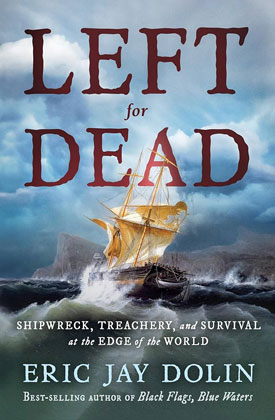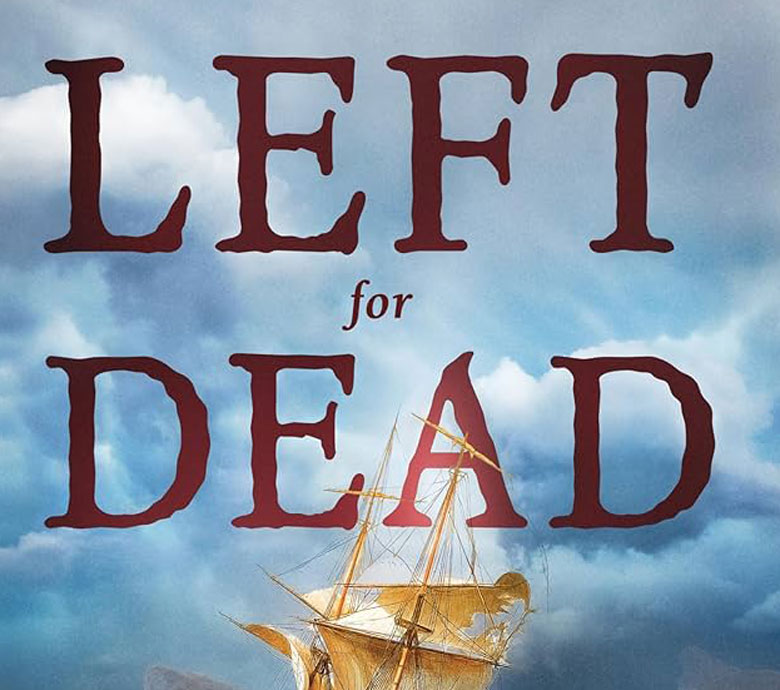
Eric Jay Dolin says he loves all the books he’s written, but his latest one, Left for Dead, is special, he says. “This may be a hard thing for an author to say, because why wouldn’t an author always say that their book is great?” he says. “But, this is definitely one of the most exciting, the most focused and the most novel-like of any of my books.”
Released on May 7, Left for Dead tells the kind of dramatic and emotional tale that stories about mariners and the sea are renowned for: adventure, near-death experiences, perfidy, courage, and wonder.
Set against the backdrop of the War of 1812, the book recounts the struggles of an American sealing crew and the wreck of a British ship carrying passengers home to England, including a pregnant woman who gives birth, on the deserted Falkland Islands, and the treacherous machinations that leave five of those people and one remarkable dog abandoned.
A lot of these stories are the most dramatic because people die, people wreck, people get lost, people stay at sea for four or five, six years…
Dolin, the author of numerous books of maritime history, such as Leviathan and Rebels at Sea, will be in Maine in the coming months promoting Left for Dead, including a presentation with local maritime author James Nelson on May 15 at Maine Maritime Museum in Bath. Check his website, ericjaydolin.com, for events, and to read the first chapter of his new book.
The Working Waterfront spoke to Dolin in April. What follows is an edited version of that conversation.
WW: You say in the book this story isn’t largely known today, even to historians. How did you find it?
Dolin: The way that I come up with topics, oftentimes it’s when I’m working on a book and in working on that book, I stumble across some other topic. That’s not what happened here. There’s a book written in the 1970s by a professor in the Midwest. It was basically just an annotated list of maritime disasters and tales from the 1600s up through the early 1900s.
When I looked through that book, I came upon this story of Charles Barnard and the Nanina going to the Falkland Islands.
The paragraph was very brief. It didn’t have a lot of details, but it did mention that five men were marooned on the Falklands for about 18 months, and that got me really interested.
He listed a couple of books, and one was written by Charles Barnard himself about his experience on the Falklands. I read his book and I said, “Oh, this is a great story.” It was dramatic, it was unknown, it involved maritime issues—which always excite me—and it had some really good characters in it.
WW: One of the most compelling things for me was the juxtaposition of the decisions the Americans made when offering help to the wrecked British passengers versus those of the rescuing British.
Dolin: The Americans viewed this as a humanitarian gesture, and of course as human beings, they had to reach out to these desperate individuals who had been wrecked on this desolate island. So, they came up with an agreement, which they thought was fair and the right thing to do, but then you get the British officer, D’Aranda, showing up, and he didn’t care at all about this agreement that was reached. Not only didn’t he honor the agreement, he viewed this as an opportunity to get a prize of war. And even worse than that, is when they left the five hunters on Beaver Island. It was a cold-hearted thing.
WW: Why are we so fascinated by people who go out to sea?
Dolin: I think there are a lot of reasons, one of which is the ocean and people going out in the ocean and doing their business in the great waters is such an important element of American history. We were for many years a maritime nation.

But another element is, for many people, it’s an alien part of our history. When we read stories about whaling, about sealing, about exploration like by Capt. Cook and other people, I think most people don’t have that as part of their daily experience. And it’s like being a voyeur on a totally different story of life.
And it’s fascinating because it’s dramatic. A lot of these stories, the ones that you hear about, are the most dramatic because people die, people wreck, people get lost, people stay at sea for four or five, six years and come back to a totally different family in some cases.
This has always puzzled me: for whatever reason, stories about the ocean are viewed by us as romantic. It was not romantic at all. We marvel at the sheer courage that these people displayed in pursuing their livelihood. Unfortunately, in many instances, they were forced to do this for economic reasons. I mean, going out in the open ocean, especially as one of the crewmen, was not a particularly great way to make a living, but there weren’t a lot of great ways to make a living back then on land or at sea, and you did the best you could and you took the risks as they came.
Meet the Author: May 15, 1 to 2:15 p.m., Maine Maritime Museum, 243 Washington St., Bath.
Event is free, but registration is required. Go to mainemaritimemuseum.org/event/author-event-eric-jay-dolins-left-for-dead/.





